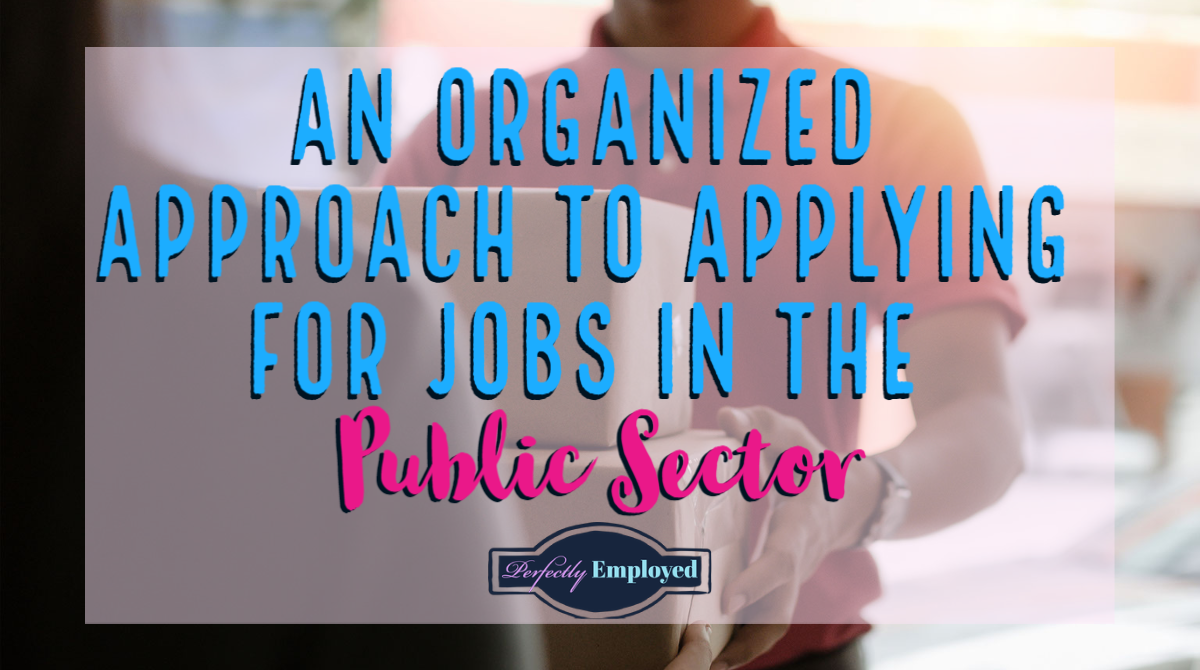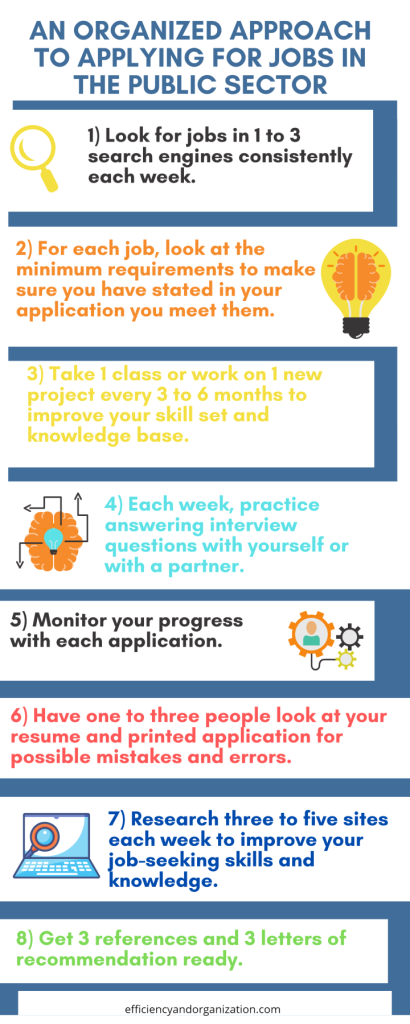
Questions
- Are you looking to get employed in jobs in the public sector, like government offices, state facilities, or school districts?
- Are you looking for some tips and advice on how to go about applying to increase your chances of landing a position?
If you answered yes to these questions, keep reading!
Public Sector Jobs
Public sector jobs are otherwise known as “government” jobs. These include:
- School positions (teaching and non-teaching)
- Emergency services
- Park maintenance
- Armed forces
- Post office operations
- Safety – police and fire
- Regulatory agencies
- City operations
- Civil Service
- Tax-related services
- And more
If you have ever dealt with the IRS, Department of Motor Vehicles, the court system, Social Security Administration, the Sherriff’s Department, you have received services from someone who is working for the public sector.
Unlike the private sector, public sector jobs are not revenue-driven. They are funded by tax dollars. The jobs are for businesses that are owned or controlled by the government, whether it’s federal, state, or local.
Generally speaking, public sector jobs do not pay as well as private sector jobs. In other words, the salaries are lower. However, the benefits packages that they offer make it worthwhile to look for employment opportunities. Public sector jobs are also more stable. While profit-based companies are prone to closures and layoffs due to reduced revenues, public sector jobs are more stable because they are backed by the government.
To get into a position within local, city, state, or federal government facilities, there are certain things you must consider before applying. For example, it takes time to land a position. You might have to wait up to 3 months to hear back about a position you applied. Your application must meet the minimum qualifications for the job posted on the job description. If not, your application will be screened out. There are tests to take for almost every position to see if you meet minimum requirements. Also, background checks will be required for these positions.
Applying for Jobs in the Public Sector: 8 Tips and Ideas
- Ask yourself questions.
Here are some examples:
- Am I getting enough satisfaction from my current job?
- Is my job what I always wanted to do?
- Am I living with purpose?
- Am I unhappy with my body image?
- Are my personal finances making me unhappy?
- Am I upset with myself for not having obtained more education?
- Would I be happier if I moved out of where I am currently living?
- Is there someone I admire and wish to emulate?
- For those whom I look up to, what do they have that I want to have?
Take time to truly understand what aspects of your life you want to change to be happier, and more content. This process might take a few months. However, do not keep questioning and questioning yourself without your questions leading to any solutions. Be decisive and take charge of your life to make improvements!
An Organized Approach to Getting a Job in the Public Sector
To increase your chances of success with landing a job in the public sector, keep these ideas and tips in mind. Remember, you will increase your chances of finding employment if you are organized, thorough, consistent, and efficient with the process!
- Look for jobs in 1 to 3 search engines consistently.
Mark your calendar to visit these sites every 3 days to search for new opportunities that get posted. This is how you will build consistency. Write down your usernames and passwords for easy access.
- USAJOBS.gov
- Edjoin.org
- USA.gov
- State jobs (depending on the state): jobs.mo.gov for Missouri, calcareers.ca.gov for California, twc.texas.gov for Texas, and more. Type “public sector jobs in ___________” whichever state you are in to see what search engines come up.
- Apply for jobs for which you meet minimum requirements.
Many institutions, both in the public and private sector, use software programs that scan applications and resumes automatically to screen out those who do not meet minimum requirements. If a position asks for 5 years of driving experience, for example, you must actually write that in your application or resume. If you do not, you’ll be screened out. Be as organized as possible when it comes to meeting the minimum job requirements to increase your chances of being selected for the next step in the process.
- While you are applying, start preparing for the next steps.
Once you submit an application, you are waiting to receive a call or an email telling you that you need to take a test or have an interview. Be as proactive as possible. Start preparing for interviews. This is especially important if you have not interviewed for a while. Search for types of interview questions they might ask and get ready with possible answers. The more you practice, the better you will become!
- Work on self-development to increase your chances of landing a position.
Self-development means increasing your skillset or education. For example, if the job you want asks for a bachelor’s degree, go back to finish your degree. If it asks you to know graphic design, take classes at the community college where you can earn a certificate. Remember, the more you have compared to everyone else who is trying to apply for the same job, the higher your chances will be of getting employment.
- Monitor your progress with each application.
Have a tracking system to know how many jobs you have applied for each week, how many interviews, and how many tests you have been invited to take.
- Have someone look at your resume and printed application for possible mistakes and errors.
If you are one of 50 people who has applied for a job and only 10 are being called for an interview, your application and resume will be looked at in detail. If you have spelling and punctuation errors that you overlooked or did not realize you made, your chances of being screened out will be higher. For example, if you wrote, “I insure that reports are correct before submitting them,” is wrong. The proper phrase should be, “I ensure that reports are correct before submitting them.” Many people make these types of mistakes unknowingly. Have someone who has strong language skills look at your resume and application for possible errors.
- Get your references and letters of recommendation in place.
Depending on the job for which you are applying, you might be asked to provide references and letters of recommendation. Collect up to 3 letters of recommendation from people you have worked with, even on a volunteer basis. Also, contact 3 people with whom you have worked to make sure they know you are putting them down on your applications as references.
- Research three to five sites each week to improve your job-seeking skills and knowledge.
Related Posts You May Enjoy
- How To Improve Your Chances Of Getting Your Dream Job
- 4 Ways To Hit the Ground Running At Your New Job
- 7 Hard Skills That Will Make You More Employable
- 5 In-Demand Careers For 2021
Conclusion
Searching for a job in the public sector could be time-consuming and cumbersome. Use an organized approach when applying to become more efficient and consistent with the process. Here is a checklist you can use:

The same checklist appears on https://efficiencyandorganization.com/career and has a downloadable PDF.
Remember, it takes time and do not give up. Just get better and better at the process. Work on your areas of where you need to improve. Also, keep in mind that if you do not get positions after you interview, it may be that someone from within the organization got promoted. This can be disheartening to you as an outside applicant but again, do not give up. There will be an opportunity presenting itself to you when the time comes!
Author’s Bio

Ruzanna Hernandez, Ed.D. is a public-school administrator, author, and small business owner. She is the creator of efficiencyandorganization.com, a website that provides steps, strategies, tips, and techniques for living every aspect of life in an organized and efficient manner to achieve more.
Hernandez has achieved many challenging goals in her life, thanks to her systems and processes. She shares her strategies on her Youtube channel and her website to help everyone live life fully and without regrets! To learn more about her story, please visit ruzannahernandez.com. Her book, Efficiency and Organization, is available for purchase on Amazon and other book retailers.
Save to Pinterest





